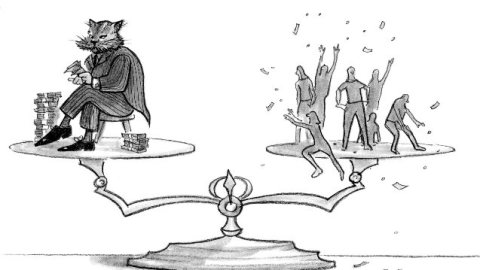Can Systems Of The People, By The People, For the Titans, Long Endure?

If politics is mainly “the economy, stupid,” can cherished ideas from the former help the later?
Lincoln proclaimed good government is “of the people, by the people, for the people,” (from Wycliffe’s 14th-century Bible). That last clause provides a tyranny test. Tyranny being any power used “not for the good of those…under it,” but for the tyrants benefit.
Shouldn’t economies be run “for the people”? Not the private benefit of elites?
1. Economic tyranny? Seas of data say yes; 1975-2007 the bottom 90% of Americans got under 20% of total income gains vs around 70% in Europe; median US income has barely increased since 1988 while the UK’s is up 35%.
2. Market merit: Hard work is rewarded? US GDP per capita swelled 52% since 1988, but 50% of workers got none of that gain. Is “the meritocracy of capitalism…a big, fat lie“?
3. Common interests: Rising tides haven’t lifted all boats. Plato’s “ship of state” metaphor better captures that we’re on a single vessel atop which private success must build. Luxury cabin occupants ignoring galley wage-slaves below risk destabilizing the ship. However unequal the upside, we share the downside if the ship sinks.
4. Separatist success: Tyler Cowen lets the veil slip in saying societies owe “strong… support for their most successful citizens.” Aren’t all citizens due that? The weak even more than the strong? To determine if the “most successful” are good or bad see here.
5. Unwholesome titans: Thomas Piketty’s book documents how wealth tends to concentrate. That rich-get-richer dynamic is especially dangerous if they use their power to skew policy, see “US is an oligarchy.” No politics of parts or economics of echelons can work unless the health of the whole governs.
6. Replaceable titans: Is inequality a necessary evil? Must taxes on the wealthy be low? Well many innovators are driven by passion, not only money. They previously built stronger economies under higher taxes. If entrenched titans work less, other hungrier wannabe-titans can replace them.
7. Freeloader titans: Corporations and entrepreneurs seeking to evade or lower their taxes are free-riding or cheap-riding. Taxes aren’t paid only for direct benefits, they’re to keep the whole ship afloat. It’s in nobody’s rational interest to damage what they depend on.
8. Lax titans: Blanket resistance to regulations bespeaks self-serving laziness or weakness. Each must be considered in context. Some “inefficiencies” desirably put public interest above private profit (e.g. minimum wages reduce subsidies to businesses). Strong titans will figure it out. Laxer rules beget weaker titans.
Orwell reviewing Hayek’s Road To Serfdom said free markets were “a tyranny probably worse…than that of the state.” He knew tyrants are easier to stop than a “tyrantless tyranny” of bad ideas. A constitution-like balance of powers within economies must ensure they serve “the people.”
Illustration by Julia Suits, The New Yorker Cartoonist & author of The Extraordinary Catalog of Peculiar Inventions.





